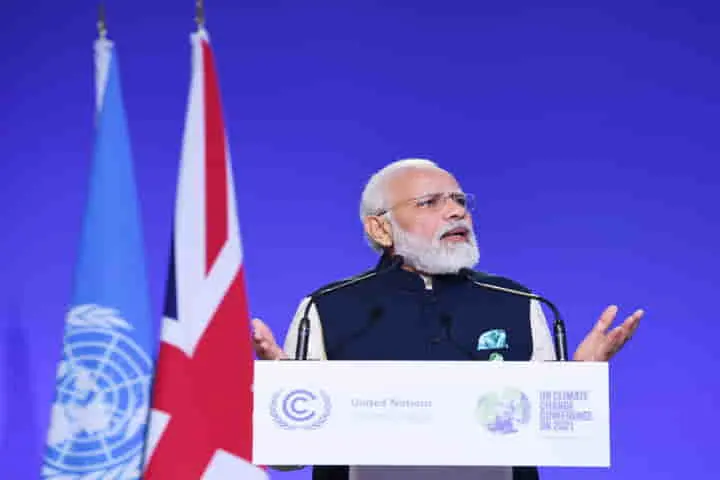Making the national statement at the COP26 global climate summit in Glasgow, Prime Minister Narendra Modi said India will achieve net-zero emissions by 2070 and would meet half its energy requirement from renewable energy by 2030.
Terming the commitments as "panchamrit" the PM reiterated that India is working very hard on tackling climate change-related issues.
"India is the only country that is delivering in 'letter and spirit' on the Paris Declaration commitments on tackling climate change," PM Modi said.
The five elements of 'Panchamrit' presented by PM Modi at the climate summit:
- India will reach its non-fossil energy capacity to 500 GW by 2030.
- India will meet 50 percent of its energy requirements from renewable energy by 2030.
- India will reduce the total projected carbon emissions by one billion tonnes from now to 2030.
- By 2030, India will reduce the carbon intensity of its economy to less than 45 percent.
- By 2070, India will achieve the target of net zero emissions.
He also took the developed countries to task saying, "So far, all climate finance promises have been empty ones. Developed countries must ensure 1 trillion dollar climate finance at the earliest. It is the need of the hour to put pressure on those countries that have failed to deliver on their promises about climate finance."
Delivering the National Statement at the @COP26 Summit in Glasgow. https://t.co/SdKi5LBQNM
— Narendra Modi (@narendramodi) November 1, 2021
India, which is home to 17 per cent of the world's population, accounts for only about 5 per cent of total (greenhouse gas) emissions, Prime Minister Narendra Modi said in Glasgow.
He also called for a global push to adopt sustainable lifestyles. "Instead of mindless and destructive consumption, we need mindful and deliberate utilisation," he said, citing consumer choices in areas from packaging to diet."These choices, made by billions of people, can take the fight against climate change one step further," he said.
India’s stand has been that developing countries tend to pollute less per head of population and are not responsible for most emissions that have taken place in the past. It was the industrialised countries that were mainly responsible for the emissions which have led to the current crisis.
The 2070 deadline for zero net emissions set by the Prime Minister gives India sufficient carbon space to ensure that its development goal is not affected and it goes beyond China’s commitment of 2060 as the date for zero emissions.




















